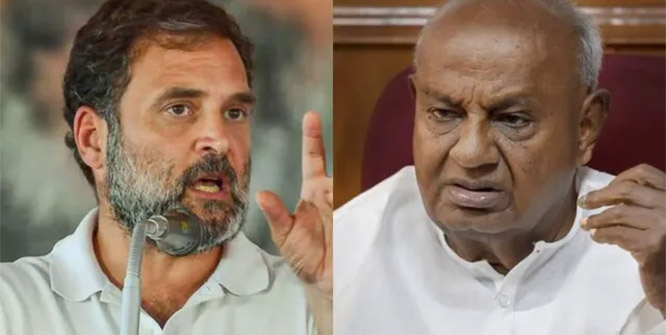New Delhi, May 20: The success of the Congress-JD(S) alliance in outpacing the BJP in Karnataka elections bodes well for opposition unity, with a chorus of regional voices hailing the Grand Old Partys decision to play second fiddle to a smaller outfit in the southern state.
Congratulatory messages poured in from the regions soon after BJP?s BS Yeddyurappa, unable to garner the numbers required for a simple majority in the state Assembly, bowed out as chief minister, paving the way for a JD(S)-Congress government.
The Congress partys decision to allow the Janata Dal (Secular) to take the lead in the state by installing its chief minister was applauded by many leaders, with NCP chief Sharad Pawar describing the role of the Congress as a ?sensible? one.
But while Pawar congratulated Congress president Rahul Gandhi for ousting the BJP, West Bengal Chief Minister Mamata Banerjee, among the first to call the developments a victory of the regional front, did not mention Gandhi in her message.
?Democracy wins. Congratulations Karnataka. Congratulations Deve Gowda ji, Kumaraswamy ji, Congress and others. Victory of the ?regional front?,? she said.
The sub-text was clear: some regional leaders would not allow the Congress take the lead in forming a broad platform of the opposition.
While an opposition leader felt the Congress would need to play a more ?gracious role? in a grand alliance before the 2019 Lok Sabha elections to keep the BJP and RSS out, senior CPI leader D Raja said the question of who would lead the front should be kept open.
Gandhi had ruffled some opposition feathers when, on the eve of the Karnataka elections, he had positioned himself as a prime ministerial candidate for the next LS polls if his party did well.
Raja, however, stressed the issue of who would be prime minister in 2019 should be discussed at a later stage.
"The instant focus should be defeating the BJP," he said.
What is clear is that the Congress understands the need to keep regional parties happy -- which explains why it agreed to be the junior partner in the Karnataka government led by HD Kumaraswamy of the JD(S).
In his statement after the fall of the BJP, Gandhi lauded JD(S) chief HD Deve Gowda for the coalitions victory.
"The opposition will unite and coordinate to defeat the BJP," Gandhi said.
But this may require more give and take than the Congress is used to.
"Congress President Rahul Gandhi is the most appropriate person to lead the country,? party communications head Randeep Surjewala told PTI, though he did not elaborate.
That said, the Karnataka developments sounded a clarion call for opposition unity.
From the DMKs MK Stalin and Loktantrik Janata Dals Sharad Yadav to TDPs N Chandrababu Naidu, RJDs Tejwaswi Yadav and TRSs K Chandrashekhar Rao, every regional leader urged non-BJP forces to align to defeat the BJP.
?May this herald the coming together of secular parties,? said Stalin.
Naidu, who worked to defeat the BJP in the Telugu-speaking belt of Karnataka, said, "It is a proud day for all of us.?
The May 12 election over and done with, all eyes are now on how the Congress plays its role as the central pole of opposition unity.
In Karnataka, the party acted strategically and swiftly to win over the JD(S) with the offer of the chief ministerial post, and sacrificed its own space for larger political gains.
But the move is also being seen as a sign of the partys decline in the state.
That its seats went down from 122 in 2013 to 78 could be read as Gandhis failure to steer the party to a majority, despite hectic campaigning and addressing 85 small and big rallies over three months.
This was the first state election after Gandhi became Congress president in mid-December, and the party wanted to pull out all the stops to form a government.
This explains the partys offer of unconditional support to the JD(S), which, with its 37 seats, clinched the deal for it.
Opposition leaders said Congress would have to show the same openness and flexibility going forward and ensure it gave space to other parties, even if it wanted to lead the front.
?Congress should give space to regional parties and there should be more give and take to help bring everyone together on one common platform," senior NCP leader Tariq Anwar, a former Congressman, said.
It should target a "consensual government" with regional parties based on a policy of give and take, he said.
"Then only will a good national alliance be formed to counter the BJP in 2019," Anwar told PTI.
The NCP leader, however, batted for the Congress retaining the top post saying past experiences of giving the post to regional players had not yielded results.
"A bigger party should be the centre of any coalition government and should take the number one position. This would be better," he said adding that the target should be to defeat the BJP.
But Raja of the CPI, while terming Karnataka a "positive development", stressed that the Congress had to be "realistic and flexible".
"This situation demands a broader coalition of all democratic forces. Congress party must be realistic and flexible in its approach to regional parties and democratic forces. It should be more accommodating," Raja said.
The equations are changing. How far the Congress goes in accommodating its allies may determine how far the BJP will go in 2019.







Comments
Add new comment